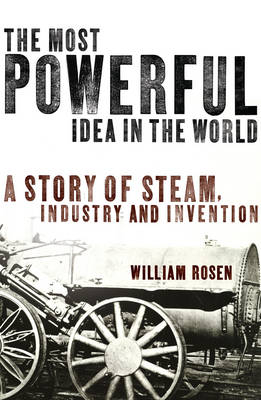
The Most Powerful Idea in the World
A Story of Steam, Industry and Invention
Seiten
2010
Jonathan Cape Ltd (Verlag)
978-0-224-08225-9 (ISBN)
Jonathan Cape Ltd (Verlag)
978-0-224-08225-9 (ISBN)
- Titel ist leider vergriffen;
keine Neuauflage - Artikel merken
States that the most important invention of the Industrial Revolution was invention itself. This book offers an account of how inventors first came to own and profit from their ideas - and how invention itself springs forth from logic and imagination. It explains how 'eureka' moments occur - when the brain is most relaxed.
'The most important invention of the Industrial Revolution was invention itself.' Those words are at the heart of this remarkable book. The Most Powerful Idea in the World is more than a stunning history of the Industrial Revolution and the steam engine at its core. It is an amazing account of how inventors first came to own and profit from their ideas-and how invention itself springs forth from logic and imagination.
Rocket. It was the fortuitously-named train that inaugurated steam locomotion in 1829, jump-starting two centuries of mass transportation. As William Rosen reveals, it was the product of centuries of scientific and industrial discovery. From inventor Heron of Alexandria in 60 AD to James Watt, the physicist whose 'separate condenser' was central to the development of steam power, to businessman Matthew Boulton, who envisioned whole factories powered with Watt's engines-all those who made possible the long ride towards the Industrial Revolution are brought to unforgettable life.
But crucial to their contributions are other characters whose concepts allowed their inventions to flourish: John Locke, who conceived of what we now know as 'intellectual property', and Edward Coke, whose work led to the patent system that, as Abraham Lincoln said, 'added the fuel of interest to the fire of genius'. Along the way, Rosen takes us deep into the human mind, explaining, for example, how 'eureka' moments occur-when the brain is most relaxed.
Astonishingly erudite yet completely accessible, this is a superb and inspiring work about the experiments and accomplishments that led to a revolution, the effects of which still power and plague us today.
'The most important invention of the Industrial Revolution was invention itself.' Those words are at the heart of this remarkable book. The Most Powerful Idea in the World is more than a stunning history of the Industrial Revolution and the steam engine at its core. It is an amazing account of how inventors first came to own and profit from their ideas-and how invention itself springs forth from logic and imagination.
Rocket. It was the fortuitously-named train that inaugurated steam locomotion in 1829, jump-starting two centuries of mass transportation. As William Rosen reveals, it was the product of centuries of scientific and industrial discovery. From inventor Heron of Alexandria in 60 AD to James Watt, the physicist whose 'separate condenser' was central to the development of steam power, to businessman Matthew Boulton, who envisioned whole factories powered with Watt's engines-all those who made possible the long ride towards the Industrial Revolution are brought to unforgettable life.
But crucial to their contributions are other characters whose concepts allowed their inventions to flourish: John Locke, who conceived of what we now know as 'intellectual property', and Edward Coke, whose work led to the patent system that, as Abraham Lincoln said, 'added the fuel of interest to the fire of genius'. Along the way, Rosen takes us deep into the human mind, explaining, for example, how 'eureka' moments occur-when the brain is most relaxed.
Astonishingly erudite yet completely accessible, this is a superb and inspiring work about the experiments and accomplishments that led to a revolution, the effects of which still power and plague us today.
William Rosen is the author of Justinian's Flea: Plague, Empire and the Birth of Europe. He was previously an editor and publisher at Macmillan and Simon & Schuster publishing houses for more than twenty-five years, working with authors including Bernard Lewis, Felipe Fernandez-Armesto, Philip Craig and Tim Clayton, Marina Benjamin, and Robert Lacey. He lives in Princeton, New Jersey.
| Erscheint lt. Verlag | 3.6.2010 |
|---|---|
| Verlagsort | London |
| Sprache | englisch |
| Maße | 162 x 240 mm |
| Gewicht | 653 g |
| Themenwelt | Geschichte ► Allgemeine Geschichte ► Neuzeit (bis 1918) |
| Geschichte ► Teilgebiete der Geschichte ► Wirtschaftsgeschichte | |
| Sozialwissenschaften | |
| ISBN-10 | 0-224-08225-6 / 0224082256 |
| ISBN-13 | 978-0-224-08225-9 / 9780224082259 |
| Zustand | Neuware |
| Haben Sie eine Frage zum Produkt? |
Mehr entdecken
aus dem Bereich
aus dem Bereich
Giordano Bruno - ein ketzerisches Leben
Buch | Hardcover (2024)
C.H.Beck (Verlag)
29,90 €
das dramatische 16. Jahrhundert
Buch | Hardcover (2024)
Rowohlt Berlin (Verlag)
34,00 €


